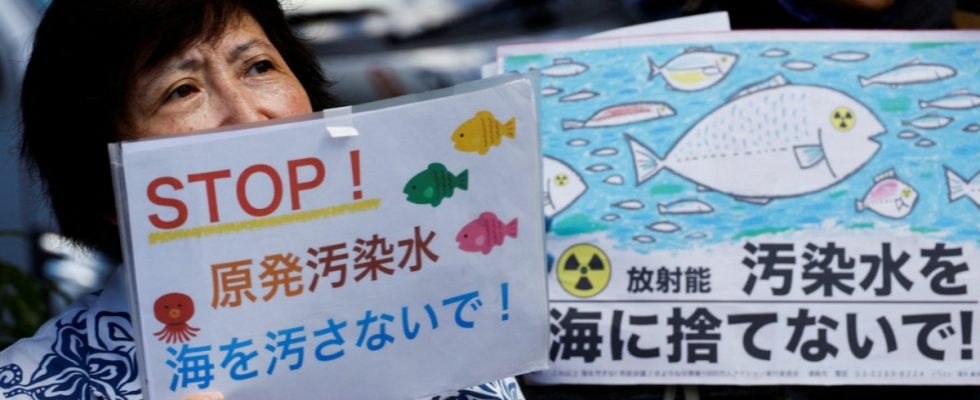Thursday was a good day for Tepco, the operator of the defunct Fukushima Daiichi nuclear power plant on Japan’s east coast. On Thursday, the energy producer was allowed to start discharging treated cooling water from the reactor ruins through a tunnel, heavily diluted, into the sea. It has been almost twelve and a half years since a tsunami triggered a triple meltdown in the power plant. Every day, Tepco needs about 170 tons of water to cool the remaining highly radioactive scrap. The catch tanks are almost full. Tepco didn’t have much time left. It must be a relief for the company’s specialists that the water can finally drain away after cleaning, among other things with a special filter system called “ALPS”.
Whether the day was good for Japan, however, is another question. Because he has triggered a wave of anger that not only clouds the relationship with many neighbors in the Pacific region, but also leads to divisions within Japan. The IAEA, the United Nations Atomic Energy Agency, has declared Japan’s approach to be harmless because the treated cooling water only contains the rather weakly radioactive radionuclide tritium. A radionuclide is a type of atom that is radioactive because of its unstable nucleus. The IAEA has set up a website where you can follow live Tepco water discharge data. The operating company has explained its procedure many times. South Korea’s conservative government says it respects the IAEA’s ruling. Japan’s Prime Minister Fumio Kishida urges “a scientifically sound discussion”. But it’s no use.
South Korea’s opposition leader rages that Japan is acting like an ‘environmental war criminal’
On Japan’s east coast, fishermen and local residents feel left out. Around 100 of them therefore want to take Tepco and the government to court, their lawyers announced on Thursday. The aim of the process: that Tepco stop draining the water. And abroad, it’s not just those who are fundamentally opposed to Japan who are complaining, such as North Korea or the Diaoyutai Education Association in Taiwan – the association asserts Taiwan’s claims to the rocky islands in the East China Sea, which Japan administers under the name of Senkaku.
The Ministry of Health in Malaysia also said it had been checking “high-risk foods from Japan” since Thursday. The Pacific Island States Forum was upset because the Fukushima issue was still controversial among its 18 members. “We have done our best to persuade Japan not to start initiation until everyone agrees that it is proven to be safe. But Japan has made a sovereign decision,” Secretary-General Henry Puna said in Fiji. Now the focus is on Japan complying with safety standards.
The cooling water is diluted via this device and then fed into a tunnel – which leads into the ocean off Japan’s coast.
(Photo: AP)
In South Korea’s capital, Seoul, there were protests by civic and environmental groups. Opposition leader Lee Jae-myung seized the opportunity to attack pro-Japan President Yoon Suk-yeol. “Japan chose the path of an environmental war criminal,” Lee said, adding that Yoon was an “accomplice.” Vice Prime Minister Han Duck-soo, on the other hand, said excessive concern was unnecessary and warned that Japan should remain “transparent and accountable” during the 30 years that Tepco intends to dump cooling water into the sea. Seoul has banned imports of seafood from the Fukushima region since 2013.
Beijing criticizes Japan harshly, the Chinese are discussing almost in panic online
But the biggest indignation is Japan’s largest trading partner. On Thursday, China’s authorities announced a halt to all imports of fish and seafood from Japan. The government in Beijing had previously summoned the Japanese ambassador. A spokesman for the Foreign Ministry warned of a “second man-made disaster” and that Japan was a “saboteur of the ecosystem”. Beijing accused Tokyo of publishing false data about the polluted water. Japan has failed to prove that the cooling water is safe and harmless. “Once Japan begins initiation, it will be forced to endure international ostracism for many years to come.”
The criticism is probably more politically motivated. It is hardly possible for scientists in China to publicly express an assessment that contradicts the party line. And people’s discussions on the Internet seem almost panicked. China’s government had already launched a major campaign against Japan in June, allegedly to stop the discharge of the water. In various online surveys, people said they no longer wanted to eat fish products from Japan due to safety concerns. Salt containing iodine was out of stock in some online shops on Thursday. A mother shared video of her crying son tearing Japan off a world map. Many called for a boycott of Japanese products. Some declared that they would sell their Japanese game consoles for the equivalent of a few euros. “Can’t we attack Japan? Why isn’t that little country dead yet?” someone commented. “The world can exist without Japan, but not without the oceans,” wrote another.
Japanese products are more popular in China than Japan itself. A boycott could therefore harm Japanese companies. But will it really happen on a large scale? For the time being, experts assume that Japan’s economy will not particularly suffer from the escalation in the cooling water debate, even if China, Japan’s largest sales market for seafood, and the fishermen in the island state may need the help that Tokyo is promising because of the crisis. Seafood accounts for less than one percent of Japan’s exports. “Economically, the impact of a possible ban on Japanese food deliveries is minimal,” Stefan Angrick of Moody’s Analytics consultancy told Reuters.
But the anger of the others remains, and Japan will probably not get rid of it anytime soon.

